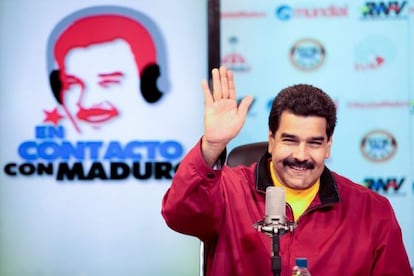Over 700,000 Venezuelans slipped into extreme poverty in one year
Twelve months after Maduro came power, 10% of population are living in precarious conditions Food shortages and inflation are hurting the poorest hardest

April 19 marked a year since President Nicolás Maduro assumed power in Venezuela, and the figures would not make his mentor Hugo Chávez proud.
Annual inflation was 56.2%, the highest in the entire Bolivarian period, the homicide rate keeps growing unchecked, and there are shortages of consumer products.
Last weekend, the INE national statistics office added another layer of bad news: the extreme poverty rate rose from 7.1% in the second quarter of 2012 to 9.8% in the same period of 2013. This means that 737,364 Venezuelans slid into extreme poverty in that period, joining a group of nearly 2.8 million citizens in a country of 30 million.
Chávez followers had prided themselves on having achieved a reduction in such indicators over the last decade. Increased public spending and higher oil revenues lifted many households out of dire need. The 2001 census showed that 11.36% of families were living below the poverty line, while a decade later that number had shrunk to 6.97%.
It was an achievement that the official propaganda machine trumpeted across the globe despite the opposition’s criticism that the government had simply changed the way in which poverty was calculated.
The state has no cash flow to import the goods the private sector is failing to produce due to a lack of incentives
Everything now indicates that the economic crisis has hit those who have the least hardest. Overall inflation was 56.2% last year, but that figure shoots up to 73.8% if only food products are taken into account.
The rise of extreme poverty may well be the clearest evidence that the government is struggling to maintain Hugo Chávez’s economic model. Out of every $100 that drop into state coffers from the sale of exports, $96 come from oil products. Other exports have practically disappeared, and private economic activity has been slashed as a result of tough exchange rates in place for the last 11 years.
To this must be added an oil production rate that has not grown according to plan, and a massive subsidy program that holds the economy back. The government refuses to adjust the price of fuel, which is costing the state around $12 billion a year, and it sells crude oil to Caribbean countries with preferential conditions.
All of the above is leaving the government with no cash flow to import the goods that the private sector is failing to produce due to a lack of incentives. In such a scenario, the price of food products has increased significantly.
Maduro announced a new social program aimed at “protecting mothers and small children”
The poverty figures drew quick reactions from the opposition and civil society. Provea, a human rights group, demanded explanations from a government that keeps boasting about its social programs.
“The devaluation of our currency in February 2013 [from 4.30 bolívares to the dollar to 6.30 bolívares to the dollar], the interrupted supply of essential services and the shortage of food and personal care products, among other things, no doubt play a role in the rising poverty reflected by the INE report,” it said in a press release.
During his weekly program, Maduro did not directly mention these results, and instead made renewed warnings about a conspiracy against his government and an economic war that prevents food supplies from growing. He also announced a new program called The Great Mission of Homeland Households, aimed at “protecting mothers and small children.”
Tu suscripción se está usando en otro dispositivo
¿Quieres añadir otro usuario a tu suscripción?
Si continúas leyendo en este dispositivo, no se podrá leer en el otro.
FlechaTu suscripción se está usando en otro dispositivo y solo puedes acceder a EL PAÍS desde un dispositivo a la vez.
Si quieres compartir tu cuenta, cambia tu suscripción a la modalidad Premium, así podrás añadir otro usuario. Cada uno accederá con su propia cuenta de email, lo que os permitirá personalizar vuestra experiencia en EL PAÍS.
En el caso de no saber quién está usando tu cuenta, te recomendamos cambiar tu contraseña aquí.
Si decides continuar compartiendo tu cuenta, este mensaje se mostrará en tu dispositivo y en el de la otra persona que está usando tu cuenta de forma indefinida, afectando a tu experiencia de lectura. Puedes consultar aquí los términos y condiciones de la suscripción digital.








































